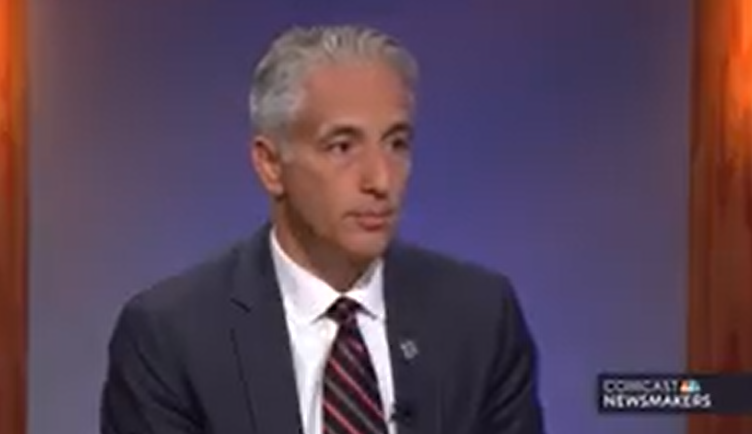DePhillips pushes to prevent tax hikes by limiting state spending

DePhillips pushes to prevent tax hikes by limiting state spending
TRENTON, N.J. – Assemblyman Christopher DePhillips joined Jill Horner on Comcast's Newsmakers last week to discuss capping state spending each year at the same 2 percent placed on local government tax levies. Municipalities have a two percent cap, which is credited with helping to slow the rapid growth of New Jersey’s notoriously high property taxes; but the state is not subject to that cap.
“The towns have been largely living within the two percent cap without a problem,” DePhillips (R-Bergen) explained to Horner. “I think it would be hypocritical for us not to do this when we are imposing the same requirement on towns.”
DePhillips said that the massive spending increases in this year’s budget are reason to make the change. This year’s $37.4 billion budget increased total spending by nearly 8 percent.
“When you pass a budget where we had 18 new tax increases built into that budget, you scare the daylights out of people,” said DePhillips. “Families and businesses are already leaving the state. And they don’t need any more encouragement to depart to other places that are rolling the red carpet out for them.”
The state budget relies on several tax increases, among them a corporate business tax surcharge, a new combined reporting requirement that will likely raise the state tax liability for large companies doing business in multiple states, and the state’s sales tax will be applied to all online purchases. Now there are also taxes on ride-hailing services like Uber and Lyft and rental services like Airbnb.
“I don’t know any private businesses in the state that can tolerate an eight percent cost increase,” said DePhillips. “Certainly no municipality can do that. It’s against the law.”
DePhillips advocated for a proposed constitutional amendment sponsored by two of his colleagues, Assemblymen Joe Howarth and Ryan Peters. It would cap state spending each year at 2 percent, but would exempt some spending categories, including those items already written into the state constitution.
The exemptions include spending on state aid for school districts, municipalities and counties, federal funding that the state uses or distributes, debt service, capital construction spending and all spending from the Property Tax Relief Fund, which is used for several state programs including the state’s Homestead tax credit and Senior Freeze property tax relief programs.
The cap would exempt spending related to emergencies or natural disasters. Also, the cap could be exceeded if the Legislature approves a fiscal emergency measure by a two-thirds majority in both chambers.
“It’s the discretionary spending that I’m talking about,” DePhillips said. “And that is what the towns have been living with; and they’ve been finding ways to stay within the 2 percent cap as to their discretionary expenses. We need to do the same at the state level.”





